-
Video
- .................................................................
La Alianza
Nuestros Derechos
Nuestras Propuestas
- 12 Cucharadas Agroecología Agua Potable Aliados Alternativas al refresco Bebidas y Alimentos en Escuelas Blog Cambio climático Campañas Conflicto de interés Derecho a la Alimentación Derecho al Agua Derecho a la información Derecho a la Salud Derechos de la Infancia Destacados Dieta tradicional Edulcorantes El azúcar y el refresco Etiquetado Impuesto a Refrescos Lactancia Materna No Dañes 1 No Dañes 2 No Dañes 3 No te hagas daño oaxacasinchatarra Publicaciones Publicidad dirigida a niños Riesgos del consumo de azúcar Seguridad Alimentaria Spots Tabaco Tips Transgénicos Videos
-
Mexico’s National Institute of Public Health study indicates the federal sugar-sweetened beverage tax is successfully reducing purchases in Mexican households
- Study with University of North Carolina reveals impacts of Mexico’s national tax on sugar-sweetened beverages implemented in 2014.
- Mexicans purchased fewer sugary drinks in 2014 due to the effects of the tax.
- Average reduction in purchases was 6%, achieving 12% by year’s end.
- Sugary drink purchases diminished across all socioeconomic levels, although the reduction was greatest among the lowest socioeconomic group, reaching 17% by the end of the year.
- Results indicate that taxes imposed on sugar-sweetened beverages can help change behaviors in benefit of public health.
Mexico City. June 16, 2015. A new study by the Mexican National Institute of Public Health and the University of North Carolina evaluated the impacts of Mexico’s national tax on sugar- sweetened beverages (SSBs) implemented in 2014. The tax is a groundbreaking effort to begin to address Mexico’s obesity epidemic. Thanks to the tax, which helped spur increased awareness and national dialogue about the risks of soda consumption, soda purchases decreased despite the aggressive tactics use by the beverage industry such as the “Share a Coke” marketing campaign with personalized Coca-Cola cans in the middle of 2014. The results of this study provide a conclusive piece of evidence that regulations based on international recommendations and scientific evidence are essential to counter the current obesity and diabetes epidemic.
Mexico faces a public health challenge associated with the deterioration of the population’s dietary habits, including the fact that it is the primary consumer of sugary drinks in the world, with an average intake of 163 liters per capita, much greater than the global average. Between 1989 and 2006, sugary drink consumption increased by 60% per capita. Strong evidence demonstrates that regular consumption of SSBs increases the probability of developing overweight, obesity, diabetes and cardiovascular diseases. In 2013, the principal causes of death in Mexico were cardiovascular diseases and diabetes resulting in 145,237 and 87,245 deaths respectively.
On January 1, 2014, a special tax on sugary drinks entered into effect, with the aim of discouraging sugary drink consumption due to its negative effects on health. The amount of the tax was one peso ($.07 USD)[1] per liter, which is roughly equivalent to a 10% increase in price.
Within this context, the national public interest coalition called the Nutritional Health Alliance[2] is highlighting the preliminary results of the study on the effects of the sugar-sweetened beverage tax on SSB purchases in Mexican households during 2014, carried out by the Mexican National Institute of Public Health and the Carolina Population Center at the University of North Carolina.
This study revealed an average reduction of 6% in the purchase of taxed sugar-sweetened beverages during 2014. This reduction increased over the course of the year to reach 12% by December 2014.[3] The mathematical model adjusted for the downward trend in SSB purchases since 2012 and took into consideration macroeconomic variables associated with purchases, such as wages and unemployment.
Preliminary results of the study, funded by Bloomberg Philanthropies and the Robert Wood Johnson Foundation, indicate that household sugary drink purchases reduced across all socioeconomic levels and that the reduction was greatest among the lowest socioeconomic group. Households with the fewest resources reduced their SSB purchases by 9% on average during 2014 and achieved a reduction of 17% by the end of the year. The study shows a 4% increase in purchases of untaxed beverages, particularly purchased bottled water, while indicating that tap water intake was not registered.
The fact that the effect of the tax was greater at the end of the year than at the beginning is supported by conclusions of other studies on taxed-goods, such as tobacco. Taxes imposed on consumer goods that are difficult to refrain from take longer to take effect and their effect increases in the mid and long term.
In this regard, Alejandro Calvillo, director of the consumer advocacy NGO El Poder del Consumidor and member of the Nutritional Health Alliance, stated, “In the final months of 2014, not only did the poorest families reduce their consumption of sugar-sweetened beverages in the home, they also were spending less on these drinks given that the decrease in SSB consumption reached 17% by the end of 2014. Therefore, the reduction in SSB purchases is surpassing the tax rate and hence, total expenditure on SSBs is lower overall.”
Furthermore, Fiorella Espinosa, nutritional health researcher at El Poder del Consumidor commented: “This data is relevant given that in Mexico complications from diabetes can lead a family to bankruptcy; health expenditures due to the consumption of sugar-sweetened beverages are greatest among the poorest families and can serve as a cause of impoverishment.” According to figures from the Mexican Institute for Competitiveness (IMCO, by its acronym in Spanish), a person who lives with complications from diabetes spends an average of $65,896 pesos ($4,761 USD) a year on medical treatment whereas s/he earns an average annual salary of $61,896 pesos ($4,472 USD),[4] a situation that is completely unsustainable.
The national Mexican SSB tax achieved a reduction in the purchase, and thus the consumption, of SSBs despite the tax rate being lower than that which is recommended and despite the diverse commercial tactics used by the beverage industry. According to recommendations proffered by national and international public health bodies, such as the INSP and the Pan American Health Organization (PAHO), in order to reduce consumption in a significant manner the SSB tax should be at least 20%.
This fiscal measure to reduce the consumption of SSBs, which is one of the causes of overweight, obesity, diabetes and cardiovascular diseases, is demonstrating its effectiveness. In the long term, this policy will result in a reduction in obesity and diabetes cases, as well as healthcare costs, as long as the tax is reinforced by a comprehensive policy to prevent and combat these chronic diseases. This can take several years and is conditional on the fact that these complementary policies to combat obesity are based on national and international recommendations free of conflict of interest.
But greater efforts must be made. «The tax has shown its effectiveness in reducing the consumption of drinks that are harmful to health, but it is necessary to complement the tax by using tax revenue for the social objective for which it was approved. Member organizations of the Nutritional Health Alliance will not desist from demanding that the government fulfill its promise to use the more than $18 billion pesos ($1.3 billion USD) collected by the tax in 2014, for the prevention of obesity and its associated diseases, especially through access to drinking water in schools and the installation of drinking fountains. It is also necessary to reinforce the positive impact of the tax on public health with a package of strict comprehensive policies, which include the effective regulation of the sale of unhealthy food and beverages in schools and effective prevention campaigns and programs, among others,” underscored Luis Manuel Encarnación, coordinator of the non-profit coalition entitled ContraPESO and member of the Nutritional Health Alliance.
In this regard, Nutritional Health Alliance members in Mexico demand:
- The SSB tax be increased from 10% to 20% in order to have a greater impact on the health of the Mexican population.
- The VAT tax on bottled water be eliminated in containers smaller than 10 liters, in order to make potable water more economically accessible than SSBs.
- The SSB tax revenue be used to install water fountains/dispensers with purification systems in schools—as well as for a comprehensive program for installing water dispensers in public and private spaces—and to implement integral prevention policy.
Preliminary study results can be consulted at: www.insp.mx/epppo/blog/3666-reduccion-consumo-bebidas.html

ASA Presentation_Mexican SSB tax reduces purchases

Press release_Mexican SSB tax reduces purchases
_____________________________________
- A conversion rate of 13.840 Mexican pesos to 1 US dollar was utilized for all peso-dollar conversions in this document, as the average currency exchange rate for 2014 according to the US Internal Revenue Service [Available at: www.irs.gov/Individuals/International-Taxpayers/Yearly-Average-Currency-Exchange-Rates].
- This national Alliance, composed of civil society organizations, academics and social movements, raises awareness and advocates for comprehensive policies to restore healthy eating habits and environments, and to combat all forms of malnutrition including obesity and its consequences.
- The evaluation utilized a database of household beverage purchases in 53 cities throughout the country, each with at least 50,000 inhabitants.
- Based on the National Census on Economic Activity and Employment 2012.
comments powered by Disqus












































